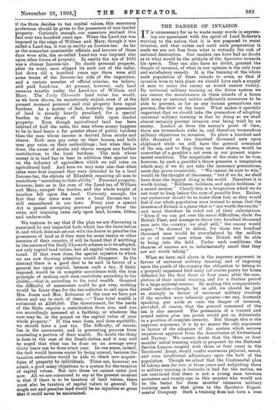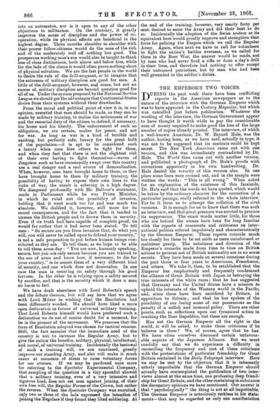THE DANGER OF INVASION.
IT is unnecessary for us to waste many words in express- ing our agreement with the spirit of Lord Roberts's warning to the nation that it is not prepared to resist invasion, and that unless and until such preparation is made we are not free from what is virtually the risk of national destruction. Our readers can have had no doubt as to what would be the attitude of the Spectator towards his speech. They can also have no doubt, granted the danger of invasion, of what in our opinion is the only true and satisfactory remedy. It is the training of the whole male population of these islands to arms, so that if invasion were to take place we should have such a supply of men to resist the enemy as would ensure victory. By universal military training on the Swiss system we can ensure the maintenance in these islands of a home field army or national militia sufficiently numerous to be able to prevent, as far as any human precautions can prevent, the blow at the heart. What makes it specially important that we should take the precaution of adopting universal military training is that by doing so we shall almost certainly prevent invasion ever being tried by an enemy. Looked at from the enemy's point of view, there are tremendous risks in, and therefore tremendous military objections to, invasion. To place a hundred and fifty thousand or two hundred thousand men upon shipboard while we still have the general command of the sea, and to fling them on these shores, would be somewhat of a gambler's act even in our present unpro- tected condition. The magnitude of the stake to be won, however, by such a gambler's throw presents a temptation which may, if we do not take the necessary precautions, some day prove irresistible. " We cannot be sure to win," would be the thought of the enemy, " but if we do, we shall have done the biggest thing in the world. Therefore it is worth trying. Boldness, boldness, and again boldness,', is a sound. maxim." Clearly this is a temptation which we do not want to keep before the eyes of possible foes. Rather, our endeavour should be to make them feel, as they would feel if our whole population were trained to arms, that the invasion of Britain is a game that is " not worth the candle," and must therefore be ruled out of their calculations. " Even if we can get over the naval difficulties, elude the British Fleet, and manage to throw two hundred thousand men into the country, we shall still," the enemy would argue, " be doomed to defeat, for those two hundred thousand men would be overwhelmed by the million or so of armed men whom the British will be able to bring into the field. Under such conditions the chances of success are so infinitesimally small that they are not worth taking."
What we have said above is the supreme argument in favour of universal military training, and of imposing upon the youth of the country the obligation to belong to a. properly organised field army (of course purely for home defence) for the first three or four years after the com- pletion of their initial training, and for a further period to a large national reserve. By making this comparatively small sacrifice—though, let us add, we should be just as strongly in favour of universal military training if the sacrifice were infinitely greater—we can, humanly speaking, put aside at once the danger of invasion, provided, of course, that the general command of the sea is also assured. The possession of a trained and armed nation plus sea power would put us defensively in a position of complete security. But though this is the supreme argument, it is by no means the only argument in favour of the adoption of the system which secures unanimous approval from the democracies of Switzerland and Norway. We cannot doubt that the three or four months' initial training which is proposed by the National Service League, coupled with three or four years in the Territorial Army, would confer enormous physical, moral, and even intellectual advantages upon- the bulk of the population. Though we admit that the Continental -plan of taking men for two or three years and subjecting them to military training in barracks is bad for the nation, we are convinced that there is not a young man between seventeen and twenty-one in this country who would not be the better for three months' intensive military training such as that given to the Spectator Experi- mental Company. Such a training does not turn a man into an automaton, nor is it open to any of the other objections to militarism. On the contrary, it greatly improves the sense of discipline and the power of co- operation, while its physical effects are beneficial in the highest degree. Three months shoulder to shoulder with their poorer fellow-citizens would do the sons• of the rich and of the moderately well off • nothing but good. The prosperous working man's son would also be-taught to think less of class distinctions, both above and below him, while for the lads of the slums it would often prove nothing short of physical salvation. We are the last people in the world to desire the rule of the drill-sergeant, or to imagine that the extremes of military discipline are good for men. A little of the drill-sergeant, however, anti some, but not an excess of, military discipline are beyond question good for all of us. Under the system proposed by the National Service League we should get the advantages that Continental States derive from their systems without their drawbacks.
From the moral and political point of view it is, in our opinion, essential that men should be made, as they can be made by military training, to realise the seriousness of war and the essential duty of the citizen to defend, if necessary, his home and his liberty. The enforcement of such' an obligation, we are certain, makes for peace, and not for war. As long as war is a kind of terrible and exciting, but perfectly safe, luxury for the great bulk of the population—it is apt to • be considered such a luxury when men hire others to fight for them, and when they feel that there is not the slightest risk of their ever having to fight themselves—waves of Jingoism such as have occasionally swept over this country are a real danger and a real source of demoralisation. When, however, men have brought home to them, as they have brought home to them by military training, the possibility of having to expose their own lives Co the risks of war, the result is sobering in a high degree. We disagreed profoundly with Mr. Balfour's statement, made in Parliament while he was Prime Minister, in which he ruled out the possibility of invasion, holding that it went much too far and was much too absolute. We disliked it, however, still more for its moral consequences, and for the fact that it tended to unman the British people and to drown them in security. Even if its truth had been capable of complete proof, we would far rather that it had never been stated. To tell men : " So secure are you from invasion that, do what you will, you will never be called upon to defend your country," is not a safe proposition to put before human beings con- stituted as they are. To tell them, as we hope to be able to tell them some day : " You are now, humanly speaking, secure, but you are only secure because you are trained to the use of arms and know how, if necessary, to die for your country," is to assure them of a very different kind of security, and one which does not demoralise. In one case the man is counting on safety through his good fortune. In the other he is relying upon a safety secured by sacrifice, and that is the security which it does a man no harm to feel.
We have dealt elsewhere with Lord Roberts's speech and the debate thereon, but will say here that we agree with Lord Milner in wishing that the Resolution had been differently worded. We should have liked a more open declaration in favour of universal military training. That Lord Roberts himself would have preferred such a declaration we do not of course doubt for a moment, for be is the pioneer of the movement. We presume that the form of Resolution adopted was chosen for tactical reasons. Still, the fact remains that the immediate need of the country is not to. increase the Regular Army, but to give the nation the benefits, military, physical, intellectual, and moral, of universal training. Incidentally the bestowal of such a training will, we are convinced, greatly improve our standing Army, and also will make it much easier at moments of stress to raise . voluntary forces for use oversee. If we may be pardoned once more for referring to the Spectator Experimental -Company, that sampling of the question in a tiny spoonful showed that a military training, even of a very intensive and rigorous kind, does not set men against joining, of their owu free will, the Regular Forces of the Crown, but rather the reverse. When the Spectator Company was recruited, only two or three of the lade expressed the intention of joining jouung the Regulars if they found they liked soldiering. At the end of the training, however, very nearly forty per cent. desired to enter the Army and did their best to do so. Incidentally the adoption of the Swiss system or-its equivalent here would greatly improve and strengthen that force for policing the Empire which we call the Regular Army. Again, when next we have to call for volunteers, to fight the nation's battles overseas, as we called for them in the Boer War, the answer would be made, not by men who had never fired a rifle or dune a day's drill in their lives, and therefore had nothing to offer except their untrained patriotism, but by men who had been well grounded in the soldier's duties.



















































 Previous page
Previous page